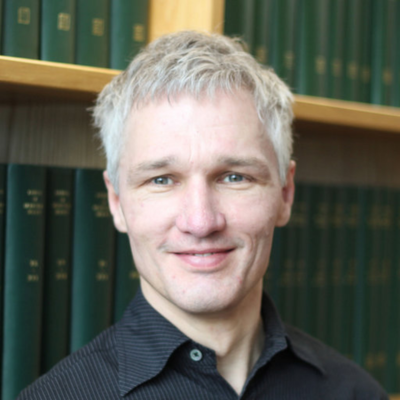
Andreas C. Joerger obtained his doctoral degree from the University of Freiburg, Germany in 2000 for elucidating the reaction mechanism and structural basis of substrate specificity of a zinc-dependent aldolase. He then assumed a postdoc position in the group of Prof. Sir Alan Fersht at the Medical Research Council (MRC) Centre for Protein Engineering in Cambridge, United Kingdom, initially working on protein design. He stayed on as a senior scientist in structural biology until 2010, before moving to the MRC Laboratory of Molecular Biology in Cambridge (2010-2015). During his long spell at the MRC, he made key contributions towards unraveling the complex structural biology of the tumor suppressor p53 and related proteins. He determined the first crystal structures of p53 cancer mutants, which led to the Y220C mutant being used as a paradigm for the development of mutant p53 rescue drugs based on protein stabilization. In 2016, Dr. Joerger joined the group of Prof. Stefan Knapp at the Institute of Pharmaceutical Chemistry at Goethe University, Frankfurt am Main. He is currently a German Research Foundation (DFG)-funded project leader on targeting the p53 mutome for cancer therapy; and co-investigator on a grant from Worldwide Cancer Research for the development of Y220C mutant stabilizers. His other research interests include the evolutionary history of the p53 pathway, epigenetic targets and general principles of molecular interactions.
Wang X, Sun J, Ahmad S, Yang D, Li F, Chan UH, Zeng H, Simoben CV, Green SR, Silva M, Houliston S, Dong A, Bolotokova A, Gibson E, Kutera M, Ghiabi P, Kondratov I, Matviyuk T, Chuprina A, Mavridi D, Lenz C, Joerger AC, Brown BD, Heath RB, Yue WW, Robbie LK, Beyett TS, Müller S, Knapp S, Owen DR, Harding R, Schapira M, Brown PJ, Santhakumar V, Ackloo S, Arrowsmith CH, Edwards AM, Peng H, Halabelian L
Nat Commun. 2025-12-18 . .doi: 10.1038/s41467-025-67403-2
PMID: 41407727Zhubi R, Chaikuad A, Muñoz Sosa CJ, Joerger AC, Knapp S
J Struct Biol X. 2025-8-18 . 12:100134 .doi: 10.1016/j.yjsbx.2025.100134
PMID: 40821731Edmonds AK, Balourdas DI, Marsh GP, Felix R, Brasher B, Cooper J, Graber-Feesl C, Kollareddy M, Malik K, Stewart H, Chevassut TJT, Lineham E, Morley S, Fedorov O, Bennett J, Rajasekaran MB, Ojeda S, Harrison DA, Ott CJ, Joerger AC, Maple HJ, Spencer J
J Med Chem. 2025-4-17 . .doi: 10.1021/acs.jmedchem.5c00395
PMID: 40244695Wang X, Sun J, Ahmad S, Yang D, Li F, Chan UH, Zeng H, Simoben CV, Houliston S, Dong A, Bolotokova A, Gibson E, Kutera M, Ghiabi P, Kondratov I, Matviyuk T, Chuprina A, Mavridi D, Lenz C, Joerger AC, Brown BD, Heath RB, Yue WW, Robbie LK, Beyett TS, Müller S, Knapp S, Harding R, Schapira M, Brown PJ, Santhakumar V, Ackloo S, Arrowsmith CH, Edwards AM, Peng H, Halabelian L
bioRxiv. 2025-2-3 . .doi: 10.1101/2025.01.17.633682
PMID: 39896675Münick P, Strubel A, Balourdas DI, Funk JS, Mernberger M, Osterburg C, Dreier B, Schaefer JV, Tuppi M, Yüksel B, Schäfer B, Knapp S, Plückthun A, Stiewe T, Joerger AC, Dötsch V
Nat Struct Mol Biol. 2025-1-10 . .doi: 10.1038/s41594-024-01456-7
PMID: 39789211Funk JS, Klimovich M, Drangenstein D, Pielhoop O, Hunold P, Borowek A, Noeparast M, Pavlakis E, Neumann M, Balourdas DI, Kochhan K, Merle N, Bullwinkel I, Wanzel M, Elmshäuser S, Teply-Szymanski J, Nist A, Procida T, Bartkuhn M, Humpert K, Mernberger M, Savai R, Soussi T, Joerger AC, Stiewe T
Nat Genet. 2025-1-8 . .doi: 10.1038/s41588-024-02039-4
PMID: 39774325Joerger AC, Stiewe T, Soussi T
Cell Death Differ. 2024-10-24 . .doi: 10.1038/s41418-024-01391-6
PMID: 39443700Gerninghaus J, Zhubi R, Krämer A, Karim M, Tran DHN, Joerger AC, Schreiber C, Berger LM, Berger BT, Ehret TAL, Elson L, Lenz C, Saxena K, Müller S, Einav S, Knapp S, Hanke T
J Med Chem. 2024-7-19 . .doi: 10.1021/acs.jmedchem.4c00411
PMID: 39028937Balourdas DI, Markl AM, Krämer A, Settanni G, Joerger AC
Cell Death Dis. 2024-6-11 . 15(6):408 .doi: 10.1038/s41419-024-06739-x
PMID: 38862470Rak M, Menge A, Tesch R, Berger LM, Balourdas DI, Shevchenko E, Krämer A, Elson L, Berger BT, Abdi I, Wahl LM, Poso A, Kaiser A, Hanke T, Kronenberger T, Joerger AC, Müller S, Knapp S
J Med Chem. 2024-2-29 . .doi: 10.1021/acs.jmedchem.3c02217
PMID: 38422480